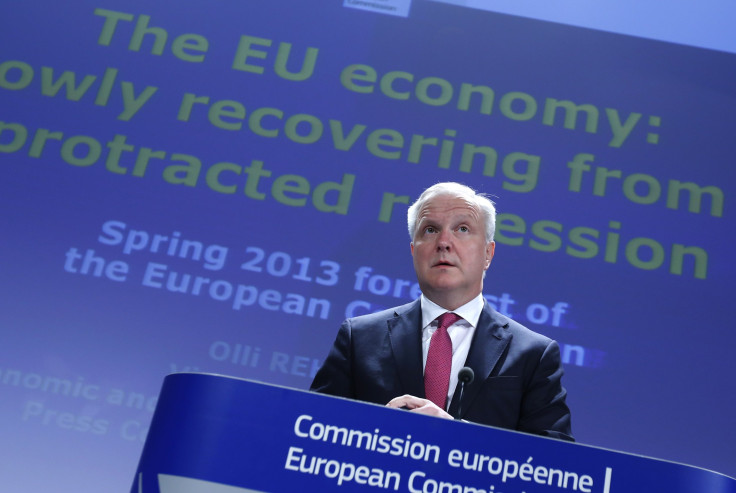European Commission Scales Back Its Euro Zone, EU Outlooks, Forecasts 0.4% Contraction In Euro Zone This Year

The European Commission scaled back its growth outlook for 2013, announcing Friday that it now forecasts the European Union's gross domestic product would contract by 0.1 percent, reversing a February projection that it would expand by 0.1 percent.
The commission also downgraded its expectations for the euro zone's biggest economies, estimating the GDP of the monetary union as a whole this year would contract by 0.4 percent, compared with a forecast made just three months ago that it would contract by 0.3 percent.
Officials in Brussels say factoring in the contraction of 0.6 percent last year, euro-zone GDP is headed for consecutive years of declines for the first time ever, largely caused by low domestic demand and limited investment. Despite very slight positive gains in GDP in certain euro-zone countries such as Germany, the pace of overall recovery is expected to be far too slow to cut widespread joblessness, which will remain high in 2013 and 2014.
Low expectations about future corporate earnings and personal income, as well as high uncertainty about the economic outlook will remain a heavy burden on domestic investment and domestic consumer activity, but EU analysts are convinced the economy is headed toward modest gains as a result of austere policy decisions in 2012 that combatted the recession. Similar fiscal policies will need to continue in 2013 and 2014, albeit to lesser degrees, to prevent a return of stress in financial markets, according to the commission report.
"Domestic demand is still constrained by a number of impediments that are typical of the aftermath of deep financial crises," said Olli Rehn, the European commissioner for economic and monetary affairs and the euro. "External demand is set to be the main growth driver this year."
Positive effects will come from stronger member economies as they recover from 2012's recession. However, weaker member economies will take a long time to recover significantly.
When evaluated alone, Germany's GDP will likely grow by 1.4 percent from 2013 to 2014, while neighboring Austria's unemployment rate will remain at a low 4.7 percent. Meanwhile, Cyprus GDP is expected to contract by a full 8.7 percent this year, revised down from a 3.5 percent contraction projected previously, and it is expected to contract by another 3.9 percent in 2014. Both Greek and Spanish unemployment rates, currently at 27.0 percent, will probably remain elevated in 2014 at 26.0 percent.
"In view of the protracted recession, we must do whatever it takes to overcome the unemployment crisis in Europe," Rehn said. "The EU's policy mix is focused on sustainable growth and job creation. Fiscal consolidation is continuing, but its pace is slowing down." He added that structural reforms must be intensified to unlock growth in Europe.
While fiscal policies have begun to impact the complex financial markets and helped to cut interest rates, Rehn said these changes have yet to be felt by small businesses, let alone by working-class families and unemployed youth on the ground. "There are so far only timid signs of easing financial fragmentation across member states, and enterprises in vulnerable economies continue to face tight credit conditions."
More positively, Rehn said the overall benign financial-market situation or faster-than-expected progress with adjustments and reforms could allow for a swifter return of confidence and advance the recovery.
© Copyright IBTimes 2024. All rights reserved.












